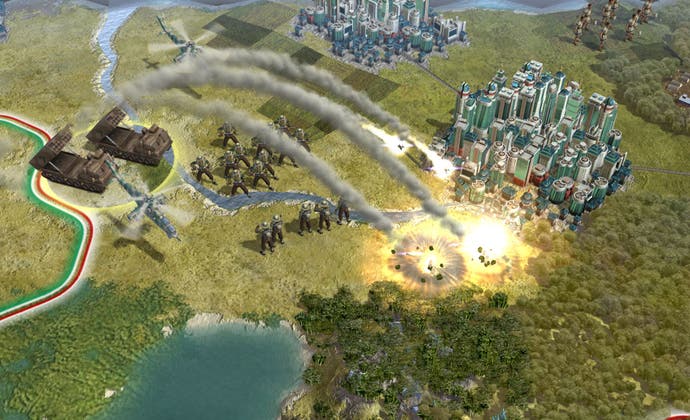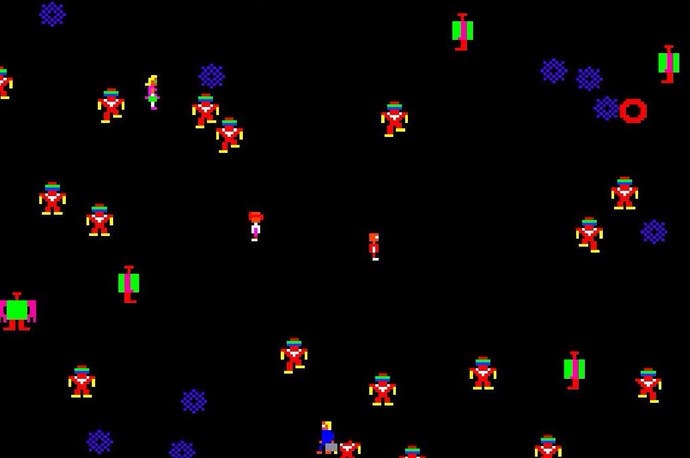Sex, shopping and video game longevity
Lastability Brown.
Recently two interesting events have made me think about this idea of lasting happiness specifically in relation to video games. First, Liam Edwards asked me to take part in his podcast series, Final Games, in which he asks his guests to name eight games they'd take to a figurative desert island. A few of the interviewees have taken this as an opportunity to just talk about their favourite titles of all time, which is fine, but I really considered the prospect of being alone with these things for the rest of my life. What sort of game can bear that level of responsibility? In the end, I went for a lot of simulations - The Sims, Civilization, Minecraft - because I felt the way these titles combine systemic depth with user creativity meant that I wouldn't get bored with them.
Then, at the recent GDC event in San Francisco, the designer and author Eric Zimmerman set an interesting theme for his annual Game Design Challenge, where a group of developers are tasked with envisioning a game based around a set theme. This time, they had to design an interactive experience that could be played daily for 30 years. The results were pretty varied. Nina Freeman created a sort of interactive soap opera where authors - or drama managers - created new story content every day, and players simply had to apply emojis to plot strands to signify their interest. If they were intrigued, they may add a smiley face; if they hated a character or scene, it may get a poop. It was kind of The Only Way is Essex meets X-Factor on Twitter. Chris Crawford, meanwhile, toyed with games based around religion and marriage, while Double Fine's Anna Kipnis created a version of the paper and pencil game Consequences, which gets players to complete each other's drawings and then psychologically analyse the other participant's additions.
These were interesting and fun experiments but they weren't hugely applicable to the way we understand games right now. Are there any current well-known titles that conceivably could entertain us constantly for 30 years? If so, what are they? And because I have a tendency to overthink and systemise absolutely everything, I started to wonder if we could effectively categorise the sorts of games that have truly life-spanning entertainment potential. After all, as video game players we're very interested in the concept of longevity - if only from an economical standpoint: games are expensive and we want to get value for money. In the olden days, game magazines used to split their review scores into separate categories - graphics, sound, etc, - but one was always longevity, or 'lastability'. The classic late 'eighties publication ACE even went as far as to produce a 'predicted interest curve' an actual graph that prophesised the lifespan of every game over a year. But even in that highly scientific era of games criticism, the understanding of longevity was limited to, say, hundreds of hours, rather than a whole lifetime.
What kinds of games last forever?

My conclusion is that we can place truly limitless games into two distinct categories: sex and shopping. I chose these terms because they're both ostensibly fun things that people like to do regularly, but they're fun for very different reasons. In the sex category are highly systemic games, which may be based around very simple rulesets, but which allow for great variety and tactical complexity and are therefore highly compulsive. Also, they tend to be a lot of fun with two or more players. These are titles like Tetris and Puzzle Bobble - they're easy to learn, sessions are quick, but there are a wide variety of possibilities. They remind me of that line in Red Dwarf where a woman tells Rimmer, "making love to you is like eating a Japanese meal: small portions but so many of them". When I asked NIna Freeman about her approach to this year's game design challenge, she specifically mentioned the brilliant puzzle game Threes.
"I thought about how we use simple repetition in games," she explained. "How familiar, simple verbs are used over and over, like a swipe in an iPhone game. For example, in Threes, you swipe over and over but it never feels boring. This is very different from other repetitive actions... like filing papers at an office job. I realized that the repetitiveness in something like Threes is fun because it's always being re-contextualized during the game loop: one swipe grants you a very different swipe from the next. One moment you're combining two ones, and the next you might be combining two twenty eights, and the feeling is very different.
"So, I tried to think about how re-contextualizing repetition from moment to moment could work in a narrative context, which is how I came to think about emoji. Using emoji in my game is a repeated element, happening daily in the game. However, the context of it is always changing because the players are expressing different things, and reacting to new scenarios using the emoji. So, it uses the same verb repetitively, but any given use of the verb may feel very different from the last. This act of re-contextualizing the verb with each use makes the emoji feel fresh and new each time it's used, helping the player stay engaged with an otherwise simple mechanic over a long period of time."
So yes, what Nina is explaining fits perfectly into my sex category. Sex is essentially a series of repetitive actions that can be endlessly recontextualised, depending on your partner(s), location and emotional state. Also, I love this idea that games can provide a vocabulary of actions, and although this vocabulary may be limited, the combination of verbs and nouns provides for endless variations. In this respect, titles like Tetris and Threes work similarly to many of the world's oldest and still widely played board games, like chess and go. Chess has only 64 squares and six different pieces, yet, as Paul Hoffman wrote in his book King's Gambit: A Son, a Father and the World's Most Dangerous Game: "In practice the possibilities in chess are boundless, although theoretically it is a mathematically finite activity - there are, for example, 988 million positions that can be reached after four moves for white and four for black." In chess, in Tetris and in sex, endless pleasure come from exploring the breadth of possibilities hidden within the constraints of the system.
So that's one type of game that could last for 30 years.
Then we have the shopping category. Shopping is a freeform, improvisational activity that involves roaming a landscape looking for discreet value exchanges. Skyrim is a shopping game, so is Grand Theft Auto, so is Dark Souls. In all of those titles, the fantasy world is the mall, your inventory is your basket and the battles are effectively purchase transactions through which you attain desirable loot and XP. The beauty of these games is that you don't need a list, you can just browse - the joy is picaresque. Exploring Los Santos is basically like going to the supermarket when you're hungry or drunk - you kind of know what you're there for, but boy are you open to suggestion.
So in short, there are two types of game that I could conceive playing for 30 years non-stop without getting bored: short, systemically deep games that offer quick varied sessions (sex); and longer, more rangey games that are about the pleasure of exploration, freedom, creativity and collecting stuff (shopping). Most of the games I chose for Final Games fell into the latter category. The Sims, Bloodborne, Civilization - they all indulge my desire to experiment, discover stuff and mess about.

I thought I'd been pretty clever, but then I asked Martin Hollis, the co-creator of GoldenEye and Perfect Dark how he thought a 30-year game would work. "I'd start with examining the underlying technology," he says. "Most consoles do not work for 15 years so one approach would be to choose an old technology that has proven to last. Just as the 747 has proven to be one of the most reliable aeroplanes and some individual planes have been in the air for 30 years, a 30 year old console that still works today would be a good bet for still working in another 30 years. It would be tempting to choose the Nintendo 64 because it is mythically - and actually - sturdy but that doesn't go far enough.
"In fact I would design a game that was played without electronics, a game that you play with stones and a wooden board would be more durable than any video game and would survive even an apocalypse. I'd also want a game that was simple enough that it implicitly allowed and encouraged the player to change the rules and discover better games. I believe no game designer in the world can be certain enough of their ability to design a game which is enjoyable or meaningful to actually play for 30 years. Any such game must be iterated and iterated. The games which come to us such as Chess and Go which have lasted for many thousands of years were not designed by one person but were adjusted and evolved, and bifurcated over time."
So I got it all wrong, my thinking was too contained. Hollis reckons that neither the technology, nor the developers, have the capacity to support such a long-term experience. I shouldn't have been thinking about sex and shopping, I should have thought about sticks and stones. Maybe we just have to accept that games offer transitory pleasure - that even the classic titles we love, even the biggest role-playing adventures, couldn't promise us three decades of fun. Hollis scuppered my whole project.
Then, he sent me an email.
"I have thought of a game," he wrote. "My idea is called 'Satisfaction' and is played by two. Each player brings their favourite console or gadget. One player is nominated 'attacker' and one is 'defender'. For as long as the attacker can hold their breath, they hit, smash and bash their machine against the defender's machine. The first machine to break into two pieces is the losing machine.
"This settles long running arguments about which machine is better, and has the additional benefit that it can be played underwater, for example in New York in 100 years."
What this taught me was a fundamental lesson about lasting entertainment. To be fun, relevant, compelling and useful over the course of 30 years, a good game, just like a good designer, a good job or a good relationship, needs one consistent factor: unpredictability. I could not have predicted Martin's response, but I'm glad I got it. The best games make you glad you played them. The best life is one that you are glad to have lived. I'm sticking with my sex and shopping categories though, because it makes amateur game design theory sound like a Jackie Collins novel.

